Final Fantasy V: Misremembrance of Things Past
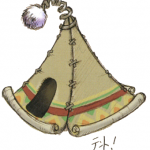 The first time I played Final Fantasy V was almost 20 years ago, in 1995. The game, passed over for U.S. release, had already achieved legendary status. My friend had imported a copy for an unbelievable $100 from a fly-by-night EGM advertiser; I borrowed his cartridge, ripped the “region protection” tabs out of my Super Nintendo, and got to work. I studied the katakana and hiragana–the first word I ever read in Japanese was “TENT”. I wandered around aimlessly, blindly speaking to every NPC until I accidentally triggered the next event. Several weeks later, I accidentally completed the game. I liked the job system and soundtrack but wasn’t quite sure how I felt about the narrative and characters. (I wasn’t sure of anything, except that they slept in TENTs.) Even so, I felt a desperate need to rank it immediately–to tie a bow on the whole experience. How did it compare to Final Fantasy IV? VI? Chrono Trigger? I had to determine my Official Stance.
The first time I played Final Fantasy V was almost 20 years ago, in 1995. The game, passed over for U.S. release, had already achieved legendary status. My friend had imported a copy for an unbelievable $100 from a fly-by-night EGM advertiser; I borrowed his cartridge, ripped the “region protection” tabs out of my Super Nintendo, and got to work. I studied the katakana and hiragana–the first word I ever read in Japanese was “TENT”. I wandered around aimlessly, blindly speaking to every NPC until I accidentally triggered the next event. Several weeks later, I accidentally completed the game. I liked the job system and soundtrack but wasn’t quite sure how I felt about the narrative and characters. (I wasn’t sure of anything, except that they slept in TENTs.) Even so, I felt a desperate need to rank it immediately–to tie a bow on the whole experience. How did it compare to Final Fantasy IV? VI? Chrono Trigger? I had to determine my Official Stance.
The second time I played Final Fantasy V was almost 15 years ago, in 1999. The game had finally been released in English as part of Final Fantasy Anthology. Well, mostly English; the translation was terrible and the port was sloppy. The shoddy nature of the whole enterprise fed my earlier uncertainty. Before, I didn’t know what the heroes were saying; now, I knew–and it was ungrammatical garbage. I felt let down–almost betrayed. Maybe Square had been right to leave this game in Japan. Maybe it wasn’t that great.
The third time I played Final Fantasy V was almost 7 years ago, in 2006. The game had been “remastered” for the Game Boy Advance. On a portable system, the game felt alive again, a tiny cartridge pregnant with possibility. The story and characters were still paper thin, but at least it moved quickly and stayed out of my way. The dialogue had been punched up by a localization crew who knew what they were doing, with charming characterizations and creative accents. And after years of plodding throughPlayStation RPGs, the zippy battles and flexible job system felt like raw speed. Maybe I had been wrong to second guess myself. Maybe the game was awesome after all!
The fourth time I played Final Fantasy V was just last week. I had an incredible time, and I doubt I’ll play a better game this year.
I wasn’t alone–more than 2500 gamers are participating in the third annual Final Fantasy V Four Job Fiesta, playing through Final Fantasy V under significant restrictions to raise money for Child’s Play. The rules are simple: at the core of Final Fantasy V lies the Job System, a list of 22 jobs given to the protagonists by the crystals of Wind, Water, Fire and Earth. Jobs are how characters do anything at all–become a Knight to equip heavy broadswords, a Black Mage to cast destructive magic, or a Dancer to…dance. The Four Job Fiesta limits you to 4 jobs, 1 from each Crystal’s loadout. Once you reach a Crystal, you send a Tweet to an impartial Twitter bot who assigns you your job. And that is your job. The die has been cast, and the other choices are forever closed off to you. The experience is equal parts hilarious and exhilarating–a combination of Russian Roulette, Brave New World’s Predestination, and traditional speed runs.
But the most exciting thing of all is that it works. Nobody’s found a party that can’t complete the game. Some finish easily, some with difficulty, and some using hacks that border on the obscene. But the four Light Warriors somehow soldier on to the end, no matter what lots they draw. Final Fantasy V’s jobs are impeccably balanced, and players truly have the freedom to play the game any way they please.
My particular playthrough was Thief / Time Mage / Ninja / Dancer — a team that dealt very little direct damage but was very, very fast. My Thief stole rare gear from bosses, and filled the team’s coffers by filching equipment from random encounters and hocking it at the shop. What the Time Mage lacks in elemental prowess, he makes up for in utility; Haste and Slow are the single most useful spells in the game, doubling your effectiveness and halving your opponent’s. And Meteor? Meteor’s so strong it doesn’t need an element. Everyone loves the Ninja for their dual-wielding and weapon throwing, but I have huge regard now for their secondary skills. Image creates a duplicate that takes two hits for the caster, while elemental Ninja Scrolls can be tossed for a quick magic blast. Dancers? Dancers are GREAT. With the correct equipment, a class I always dismissed as random and underpowered turns into one of the best and most reliable physical fighters in the game. I never would have finished the game without their powerful Sword Dance technique.
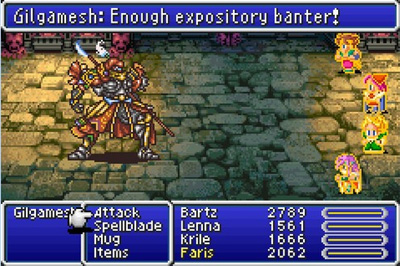 After finishing the game for the fourth time, I thought back to my previous impressions. It’s true that the jumping sprites and their tiny melodramas never managed to feel important. But today, they feel unimportant in a different way. Playing Final Fantasy V for a narrative fix would be madness; for that, I have books, movies–even newer games. But the gameplay is as fresh as ever; its flexible and creative systems even more exciting when contrasted with today’s focus-tested, everyone’s-a-winner triple-A wasteland.
After finishing the game for the fourth time, I thought back to my previous impressions. It’s true that the jumping sprites and their tiny melodramas never managed to feel important. But today, they feel unimportant in a different way. Playing Final Fantasy V for a narrative fix would be madness; for that, I have books, movies–even newer games. But the gameplay is as fresh as ever; its flexible and creative systems even more exciting when contrasted with today’s focus-tested, everyone’s-a-winner triple-A wasteland.
Imagine a film critic who refused to watch any movie over 5 years old–no, scratch that. Imagine a film director who refused to adapt any material over 5 years old. The idea that nothing written 6-plus years ago could have anything to say is ludicrous, yet that’s the critical culture videogames have engendered. Modern games are worthy of our time, respect and analysis, while “classic” games are relegated to curio status; if they’re played at all, it’s with a “slumming it” mentality, like an adult binging on YA fantasy fiction. We assume that modern games have taken the best of previous generations while discarding what didn’t work, and that we are sitting atop the evolutionary apex of the medium. Games have never been better–except for next year.
Bullshit.
Earlier this year, Baz Lurhmann adapted The Great Gatsby for a modern audience; later this year, Peter Jackson will bring The Hobbit to screens around the world. Both of those movies are based on books more than 75 years old, but their characters and themes are still relevant. Moreover, this isn’t the first time filmmakers have turned to those books; The Great Gatsby has been adapted several times before, in 1926, 1949, and 1974, while The Hobbit was turned into an animated movie in 1977. Each generation is free to reinterpret the original document–to take its own meaning from the text.
Final Fantasy V was a good game, is a good game, and will continue to be a good game. But what I like about it today, the lessons I take from its design and implementation, are very different from 20 years ago. Weaknesses–like its bare bones story–now seem like strengths. Strengths–like its dynamic job system–now seem like forgotten tribal knowledge. We can’t review games based on the specific market conditions of their release, then encase that opinion in amber for all time. We need to stay in constant dialogue with the games we love and learn from. As we change, they do too.
2 Responses to Final Fantasy V: Misremembrance of Things Past
Leave a Reply
You must be logged in to post a comment.


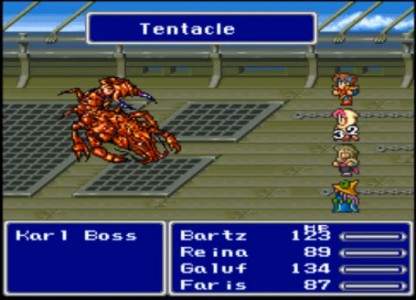
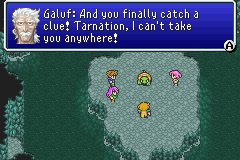

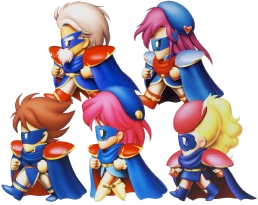
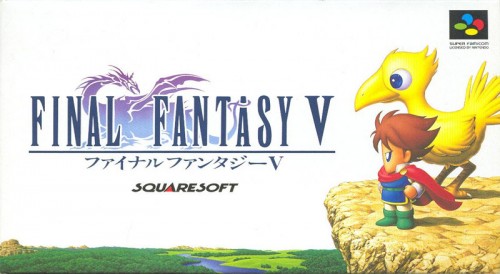









I think I have to go dig up my PS1 copy of FF5 now.
I LOVE FF5. I played a (better) SNES english translation with a flash cartridge, and I could not have enough of it. I also played FF3, and the two together represent the most fun I’ve had in the series. Despite the amazing story of FF6 and the classic status of the original and ff4, FF5 represents the culmination of the RPG to me.